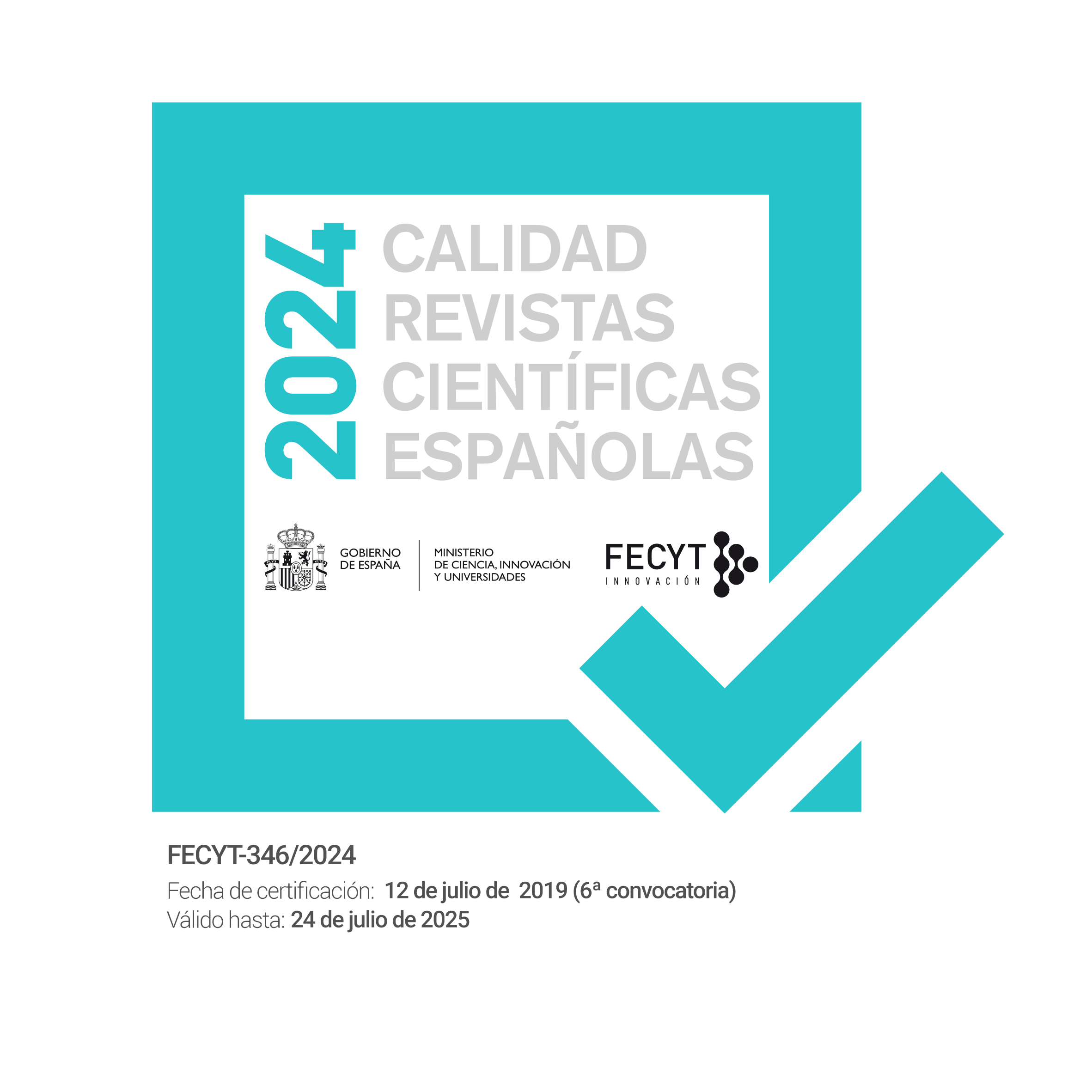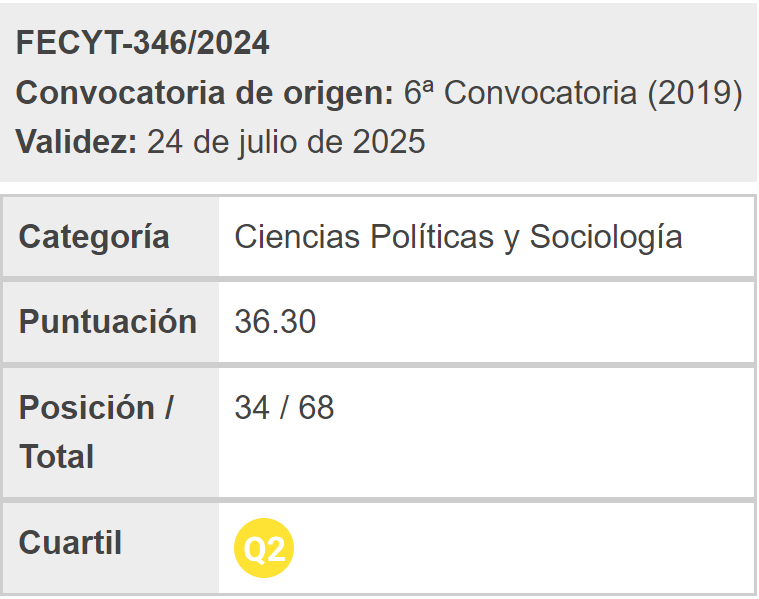Towards a biopolitical analysis of physical disability: a methodological proposal
Keywords:
biopolitics, governmentality, physical disability, methodology, FoucaultAbstract
Michel Foucault's work has become an indisputable reference for Disability Studies. However, physical disability was never a topic of interest for the French thinker, and there are hardly any references to it in all of his work. With this evidence, the purpose of this article is to offer a methodological and conceptual proposal for the study of physical disability from Foucault's work. To do so, and first of all, we will define several fundamental concepts of Foucauldian oeuvre that are valuable for a biopolitical analysis of disabilities. Next, we will establish a research problem: namely, physical disability in its contemporary meanings. Thirdly, we will limit a historical and spatial framework of analysis, pointing out for the various possibilities both advantages and potential drawbacks. The following will set out with a presentation of the methodological tools best suited to a study of this type, always bearing in mind both the precautions outlined throughout the article and the different perspectives that could be adopted. Finally, the article will conclude with an empirical case to show the relevance and usefulness of the proposed methodology.
Downloads
References
Albrecht, Gray L.; Katherine Seelman y Michael Bury (eds.) (2001). Handbook of disability studies. Sage Pub.
Barnes, Colin (1999). Theories of disability and the origins of the oppression of disabled people in western society. En L. Barton (ed.), Disability & Society. Emerging Issues and Insights (pp. 43-60). Pearson.
Beckett, Angharad E. y Tom Campbell (2015). The social model of disability as an oppositional device. Disability and Society, 30(2), 270-283. https://doi.org/10.1080/09687599.2014.999912
Berger, Peter L. y Thomas Luckmann (2012). La construcción social de la realidad. Amorrortu.
Bourdieu, Pierre (2007). La distinction. Critique sociale du jugement. Minuit.
Campillo, Antonio (2001). Variaciones de la vida humana. Una teoría de la Historia. Akal.
Campillo, Antonio (2018). Mundo, nosotros, yo. Ensayos cosmopoliéticos. Herder.
Carlson, Licia (2009). Philosophers of Intellectual Disability: a Taxonomy. Metaphilosophy, 40(3-4), 552-566. https://doi.org/10.1111/j.1467-9973.2009.01599.x
Castel, Robert (2009). Les métamorphoses de la question sociale. Gallimard.
Cayuela Sánchez, Salvador (2008). ¿Biopolítica o tanatopolítica? Una defensa de la discontinuidad histórica. Daimon. Revista Internacional de Filosofía, 43, 33-49.
Cayuela Sánchez, Salvador (2014). Por la grandeza de la patria. La biopolítica en la España de Franco (1939-1975). Fondo de Cultura Económica.
Cayuela Sánchez, Salvador (2015). Cómo aplicar el concepto de biopolítica en ciencias sociales: apuntes para una propuesta metodológica. Sociología Histórica, 5, 363-387.
Cayuela Sánchez, Salvador (2020). From walls to society. Institutions and the government of disability in contemporary Spain. Disability & Society, 36(7), 1053-1072. https://doi.org/10.1080/09687599.2020.1783207
Cayuela Sánchez, Salvador (en prensa). La invención de la discapacidad. De cuerpos quebrados, hospitales y resistencias en la España del tardofranquismo y la transición democrática. Editorial CSIC.
Cayuela Sánchez, Salvador y José Martínez-Pérez (2018). El dispositivo de la discapacidad en la España del tardofranquismo (1959-1975): una propuesta de análisis. Asclepio. Revista de Historia de la Medicina y de la Ciencia, 70(2), 232-244. https://doi.org/10.3989/asclepio.2018.16
Cayuela Sánchez, Salvador y Mercedes Del Cura González (2022). Los niños quebrados del franquismo. La vivencia de la discapacidad en un colegio de educación especial de la ANIC. Historia y memoria de la educación, 15, 229-258. https://doi.org/10.5944/hme.15.2022.30626
Cayuela Sánchez, Salvador y Paula A. Ruiz Rodríguez (2022). Un silencio que interpela. Interpretación biopolítica de la desviación física. En S. Cayuela Sánchez y P. A. Ruiz Rodríguez (eds.), Foucault y la medicina. La verdad muda del cuerpo (pp. 197-221). Morata.
Cooter, Roger (1993). Surgery and Society in Peace and War. Organization of Modern Medicine, 1880-1948. Macmillan Press LTD.
Cryle, Peter y Elisabeth Stephens (2017). Normality. A Critical Genealogy. The University of Chicago Press.
Dean, Mitchell (2009). Governmentality. Power and Rule in Modern Society. Sage.
Erevelles, Nirmala (2008). Signs of Reason: Rivière, Facilitated Communication, and the Crisis of the Subject. En S. Tremain (ed.), Foucault and the Government of Disability (pp. 45-64). University of Michigan Press.
Foucault, Michel (2001a). Dits et Écrits. 2 vols. 1954-1988. Gallimard.
Foucault, Michel (2001b). Los anormales. Curso del Collège de France (1974-1975). Akal.
Foucault, Michel (2001c). Subjectivité et vérité. En D. Defert y F. Ewald (eds.), Dits et écrits II, 1976-1988 (pp. 1032-1037), Gallimard.
Foucault, Michel (2004a). Sécurité, territoire, population. Cours au Collège de France 1977-1978. Gallimard/Seuil.
Foucault, Michel (2004b). Naissance de la biopolitique. Cours au Collège de France. 1978-1979. Gallimard/Seuil.
Foucault, Michel (2005a). Vigilar y castigar. El nacimiento de la prisión. Siglo XXI.
Foucault, Michel (2005b). Historia de la sexualidad I. La voluntad de saber. Siglo XXI.
Foucault, Michel (2006). Histoire de la folie à l’âge classique. Gallimard.
Garland, Robert (2010). The Eye of the Beholder. Deformity and Disability in the Graeco-Roman World. Cornell University Press.
Goffman, Erving (2012). Internados. Ensayos sobre la situación social de los enfermos mentales. Amorrortu.
Hacking, Ian (2001). La domesticación del azar. La erosión del determinismo y el nacimiento de las ciencias del caos. Gedisa.
Lehmann, Albrecht (2014). Cultural Anthropology and Narratology. En K. Schriewer y S. Cayuela Sánchez (eds.), Anthropological Perspectives. Tools for the Analysis of European Societies/Perspectivas antropológicas. Materiales para el análisis de las sociedades europeas (pp. 69–91). Waxmann/Editum.
Martínez-Pérez, José y Mercedes Del Cura González (2016). Introduction: Exploring Disability in the Past: on Perspectives, Methodology and Themes in Disability History. Asclepio. Revista de Historia de la Medicina y de la Ciencia, 68(2), 1-8.
Mitchell, David y Sharon Snyder (2003). The Eugenic Atlantic: race, disability, and the making of an international Eugenic Science, 1800-1945. Disability & Society, 18(7), 843-864. https://doi.org/10.1080/0968759032000127281
Moreno Pestaña, José Luis (ed.) (2021). Ir a clase con Foucault. Akal.
Moscoso, Melania (2011). La discapacidad como diversidad funcional: los límites del paradigma etnocultural como modelo de justicia social. Dilemata, 3(7), 77-92.
Moscoso, Melania (2022). The invention of Disability. Normativity, truth and power in a biopolitical concept. Alter. European Journal of Disability Research, 2, 31-42.
Oliver, Michael (1990). The Politics of Disablement. Macmillan.
Oliver, Michael (2013). The social model of disability: thirty years on. Disability & Society, 28(7), 1024-1026. https://doi.org/10.1080/09687599.2013.818773
Pinto, Louis (2009). Le Café du commerce des penseurs. À propos de la doxa intellectuelle. Éditions du Croquant.
Rose, Sarah F. (2017). No Right to be Idle. The Invention of Disability, 1840s-1930s. The University of North Carolina Press.
Schriewer, Klaus y Manuel Nicolás Meseguer (2016). El relato de justificación. Una herramienta para el análisis del franquismo. Revista Murciana de Antropología, 23, 85-102.
Sennett, Richard (2000). La corrosión del carácter. Las consecuencias personales del trabajo en el nuevo capitalismo. Anagrama.
Shakespeare, Tom y Nicholas Watson (1997). Defending the social model. Disability & Society, 12(2), 293-300. https://doi.org/10.1080/09687599727380
Stiker, Henri-Jacques (1999). A History of Disability. University of Michigan Press.
Tremain, Shelley (ed.). (2008). Foucault and the Government of Disability. The University of Michigan Press.
Ugarte Pérez, Javier (2005). Las dos caras de la biopolítica. En J. Ugarte Pérez (coord.) La administración de la vida. Estudios biopolíticos (pp. 43-72). Anthropos.
Vázquez García, Francisco (2009a). La invención del racismo. Nacimiento de la biopolítica en España, 1600-1940. Akal.
Vázquez García, Francisco (2009b). El cuerpo al límite. Por un constructivismo bien templado. Pensamiento y Creación, 14, 7-11.
Vázquez García, Francisco (2015). Georges Rodríguez Canguilhem y la biopolítica de las discapacidades. Sociología Histórica, 5, 93-126.
Yates, Scott (2008). Truth, Power, and Ethics in Care Services for People with Learning Difficulties. En S. Tremain (ed.), Foucault and the Government of Disability (pp. 65-77). University of Michigan Press.
Downloads
Published
How to Cite
Issue
Section
License
Copyright (c) 2022 Encrucijadas. Revista Crítica de Ciencias Sociales

This work is licensed under a Creative Commons Attribution-NonCommercial-NoDerivatives 4.0 International License.
Los autores/as conservan los derechos de autor y ceden a la revista el derecho de la primera publicación, con el trabajo registrado con la licencia de atribución de Creative Commons Reconocimiento-NoComercial (CC-BY 4.0), que permite a terceros utilizar lo publicado siempre que mencionen la autoría del trabajo y a la primera publicación en esta revista. Encrucijadas permite y se anima a todas las personas autoras a depositar la versión final publicada en repositorios institucionales o temáticos de acceso abierto, cumpliendo en caso necesario los términos establecidos por la entidad financiadora de la investigación.




